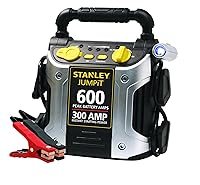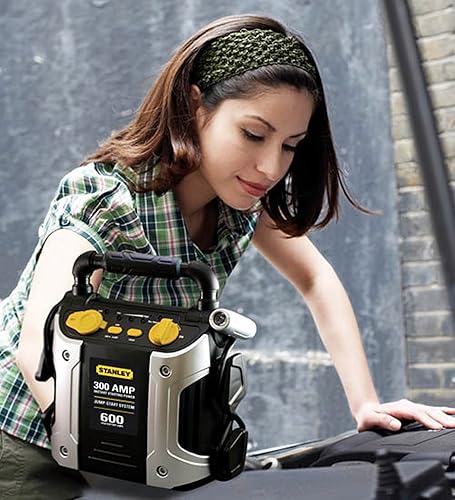Having a dead car battery can leave you stranded for hours, particularly when there’s no one around to assist. Keeping a Stanley jump starter in your vehicle ensures that you won’t be left helpless for too long.
You can think of a jump starter like a portable charger for your car battery. Stanley jump starters are reliable, consistent, and easy to use. Stanley has been making tools for over a century and is the go-to brand for professionals and amateurs alike. Their legacy of quality makes them the brand we want in our car in an emergency.
Interested in getting one of your own? Read on to learn about our top picks and how to choose the best jump starter for your car.
Best stanley jump starters comparison chart
 STANLEY J5C09 Jump Starter: 1000 Peak/500 Instant Amps, 120 PSI Air Compressor |  STANLEY FATMAX J7CS Jump Starter: 700 Peak/350 Instant Amps, 120 PSI Air Compressor |  BLACK+DECKER STANLEY J309 Jump Starter: 600 Peak/300 Instant Amps |
|
|---|---|---|---|
| Rating |  |  |  |
| Price | $109-$129 | $49-69 | $69-79 |
| Size | 11” X 8” X 13.5” | 11” X 11” X 7.5” | 11” X 10.5” X 6” |
| Weight | 1 pounds | 10.2 pounds | 8 pounds |
| Peak Amps | 1000 | 700 | 600 |
| Cranking amps | 500 | 350 | 300 |
| Voltage | 12V | 12V | 12V |
Stanley jump starter reviews
1. STANLEY J5C09 Jump Starter

The J5C09 also comes with an air compressor built in. You can use it to keep your car tires firm, but it can also be helpful for bikes and other equipment.

Most cars will have no problem starting once you’ve hooked up this device. It can instantly revive cars with standard 4-cylinder engines, and can also jump larger batteries, provided they’re not damaged. It’s intuitive to use, too – even if you’re not a car expert.
You will need to charge this unit about once a month to keep it powered up and ready. This doesn’t take long, though, and you can even charge it using the DC port in your car. For a jump starter that can boost your battery and then some, this is an excellent choice.
Pros
- Also has an outlet and USB port
- Alerts you when the connection isn’t right
- Easy to re-charge after use
- Includes 120 PSI air compressor
- Fast charging speed
- Built-in swiveling LED lamp
Cons
- On the noisier side
- Pressure gauge on compressor isn’t very accurate
- Short cable length (3-4 feet)
What’s it for?
All-purpose emergency preparedness

STANLEY J5C09 Jump Starter
2. STANLEY FATMAX J7CS Jump Starter

This Fatmax from Stanley is very similar to the model above. Both will give your car battery an instant kick and have ports for charging your other electronics. The Fatmax also includes an air compressor for your tires, making it a versatile device.

Where it differs is the size. The Fatmax is more portable, both smaller in dimensions and lighter in weight. This is great if you don’t have a lot of extra space in your trunk. It’s a bit cheaper, too, as a result, and gets top marks in our book for value.
The flip side of the smaller size is it doesn’t generate as much power. We still found it effective for most cars and batteries. You won’t want this one if your engine is especially large and powerful, though. It’s also not as likely to revive a completely dead battery as a more powerful jump starter.
Overall, we found the Stanley Fatmax to be just enough jump starter for our needs. It’s an easy way to get a quick jolt, and it’ll fit into any car or budget.
Pros
- Compact and lightweight
- Simple, fast operation
- Easy to interpret LED indicator
- Recharges quickly after use
- Includes compressor and USB charging ports
Cons
- May not provide enough power for larger engines
- Compressor is less effective
What’s it for?
Small cars, quick charges

Stanley Fatmax J7CS jump starter
3. BLACK+DECKER STANLEY J309 Jump Starter

Finally, let’s look at the J309, which is both the smallest and the least expensive item on the list. If you’re looking for the most portable jump starter, this is it. Not only can you carry it anywhere, it has a built-in clamp so you can use it hands-free.

This is an ideal option for off-roaders. It works just as well on motorbikes and other vehicles as it does on cars. In terms of power, it won’t revive a totally dead battery and it’s not built to combat charge defects. For quick fixes, though, it has you covered.
There aren’t any bells and whistles on the J309. It won’t inflate your tires or charge your cell phone. This streamlined design is part of why it’s so portable, so it’s a pro in our book if simple is what you’re after.
And you’ll still get a lot of the modern touches from the bigger models above. It’s easy to tell when the unit is charged, or if you’ve connected the cables correctly. We love how easy this jump starter is to use, and the compact build makes it very versatile.
Pros
- Clamps in place for hands-free use
- Heavy-duty, impact-resistant construction
- Comfortable to carry
- Same polarity alarm and LED display as pricier options
- Most affordable option
Cons
- Lowest charge capability on list
- No extra features
What’s it for?
Compact cars

BLACK+DECKER STANLEY J309 jump starter
What’s the Difference?
These three jump starters look very similar on the surface, so you might be wondering how to pick the right one. There are two key differences between these models: size and power. Size is easy to understand, but the different power levels might take some explanation.
All jump starters operate on the same basic premise. Energy is stored inside the device until you plug it into a rechargeable battery. The power flows, the battery revives, and your car starts. How much power the jump starter will give you is measured in two ways: peak amps and cranking amps.
Peak Amps
The number you see listed on a jump starter as its “peak amps” is the maximum power it’s capable of producing. Think of the peak amps as the jump starter’s total capacity. One with more peak amps is overall more powerful than one with less.
Cranking Amps
The cranking amps a jump starter produces is a better indicator of how much power it’ll give your battery. It measures how much power is discharged for 30 seconds in above-freezing temperatures. This is the number you want to match to your battery to make sure a jump starter will work effectively.
Safe operation
The key to safely using a jump starter is to go through the steps in the right order. Start by making sure the jump starter is turned off. Next. connect the positive clam to the positive terminal of the battery. Finally, attach the negative clamp somewhere on the car’s chassis.
The clamps are different colors to help you tell them apart: red for positive and black for negative. There will also be a plus sign on the positive clamp and battery terminal. Make sure the clamps are both firmly attached and not touching each other. Keep in mind that the car will shake when you turn it on.
With the clamps attached, turn on the jump starter. The last step should be to turn on the car’s ignition. If it doesn’t start right away, don’t crank the motor for more than a few seconds. Remove the jump starter and let it rest a few minutes before giving it another shot.
The biggest mistake most people make is connecting the clamps to the wrong places. The good news is Stanley jump starters have a polarity alarm to make sure you’re using it safely. Just follow the steps in the order above and you’ll never have to worry about damaging your battery.
So Which One’s the Best?
Buying a jump starter is like buying yourself peace of mind. You want to know that it will be there for you when you need it.
That’s why we recommend the Stanley J5C09 Jump Starter. It has the most power and can charge batteries too far gone for weaker models. We also love that it can inflate tires and charge electronics. It’s a handy all-purpose tool you might find yourself using more often than you expect.
What’s the bottom line?
A Stanley jump starter means a dead battery will never leave you stranded. That’s reasonable enough to get one for your vehicle today.
Read more: GooLoo Jump Starter Review: Here is the top 5 of 2021